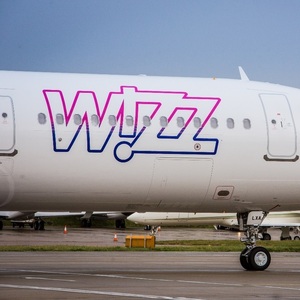Wizz Air, CEPSA partner to decarbonize aviation with SAF

April 12, 2023
BY Wizz Air
Wizz Air, Europe’s fastest growing and most environmentally sustainable airline globally*, has signed a memorandum of understanding (MoU) with Cepsa, a leading international company committed to sustainable mobility and energy, for the supply of sustainable aviation fuel (SAF) from 2025. The MoU gives Wizz Air the opportunity to purchase SAF from Cepsa to supply the airline’s route network across Spain.
Cepsa’s SAF will be produced from organic waste, such as used cooking oils or agricultural waste, among others. These biofuels promote the circular economy by being produced from waste that would otherwise end up in landfills and will make it possible to reduce lifecycle emissions by up to 80% compared to conventional kerosene.
The partnership follows an initiative that was run at Seville Airport in November 2022, when Wizz Air was among the airlines operating around 220 flights from the airport over one week using SAF produced by Cepsa at its La Rábida Energy Park in Huelva. This was the first time that the supply of SAF at this magnitude has been seen at an airport in southern Europe. It was also the first time in Spain that the entire value chain was certified traceable by the ISCC (International Sustainability Carbon Certification) system from the production of the sustainable fuel to the actual supply.
Advertisement
Advertisement
Wizz Air has established its SAF strategy, which includes securing offtake agreements with suppliers for the future to reduce carbon emissions per passenger/km by 25% by 2030 and reach net-zero by 2050. In 2022, the airline achieved its lowest ever annual carbon intensity, which amounted to 55.2 grams, 15% lower than in 2021. Wizz Air has been continuously adding new Airbus A321neo aircraft to its fleet and replacing older aircraft, with the share of new “neo” technology aircraft already surpassing 50% of Wizz Air’s fleet. The new Airbus A321neo aircraft incorporates the latest technology, offering significant environmental benefits and can currently fly with up to 50% SAF blend. In addition to its ambitious fleet renewal program, Wizz Air is constantly working on fuel efficiency initiatives and improving the related data analytics.
As one of the main producers and suppliers of aviation fuels in the Spanish market, this new agreement consolidates Cepsa’s aim to become a leader in the clean energy sector and to spearhead the decarbonisation of air transport. As part of its new strategic plan, Positive Motion, Cepsa is developing an ecosystem focused on accelerating the decarbonization of industrial customers and air and maritime transport, as well as the company itself, through the production of green molecules, mainly renewable hydrogen and biofuels. Cepsa aspires to be the leading biofuel producer in Spain and Portugal by 2030 with a production capacity of 2.5 million tons annually, with a particular focus on the sustainability of air traffic by having an annual production capacity of 800,000 metric tons of SAF.
Wizz Air currently operates flights from Europe and beyond to Alicante, Barcelona El Prat, Bilbao, Castellon (Valencia), Fuerteventura (Canary Islands), Ibiza, Madrid, Malaga, Palma de Mallorca, Santander, Seville, Tenerife (Canary Islands), Valencia and Zaragoza.
Ian Malin, executive vice president and group chief financial officer at Wizz Air, said, “We are excited to partner with Cepsa, a renowned energy company, to establish a SAF supply chain for Wizz Air in Spain. In addition to flying the world’s most sustainable fleet, we are making biofuel a key element to maintaining our leadership in sustainability and exceeding our commitment to reduce carbon intensity by 25% by 2030.”
Advertisement
Advertisement
Tobi Pardo, Cepsa’s director of aviation, said, "At Cepsa we are committed to creating solutions that make air transport more sustainable and partnerships like the one with Wizz Air to develop SAF are absolutely fundamental in our joint decarbonization journey with our clients.”
Related Stories
The U.S. Department of Energy’s Office of Energy Efficiency and Renewable Energy is soliciting public comments on a preliminary plan for determining provisional emissions rates (PER) for the purposes of the 45Z clean fuel production credit.
On July 17, Iowa’s cost-share Renewable Fuels Infrastructure Program awarded $1.12 million in grants for 20 applicants to add B11 and 4 applicants to add E15 to retail sites. This was the first meeting following the start of RFIP’s fiscal year.
Par Pacific Holdings Inc., Mitsubishi Corp. and ENEOS Corp. on July 21 announced the signing of definitive agreements to establish Hawaii Renewables LLC, a joint venture to produce renewable fuels at Par Pacific’s refinery in Kapolei Hawaii.
A new study published by the ABFA finds that the U.S. EPA’s proposal to cut the RIN by 50% for fuels made from foreign feedstocks, as part of its 2026 and 2027 RVOs, could stall the growth of the biomass-based diesel (BBD) industry.
The European Commission on July 18 announced its investigation into biodiesel imports from China is now complete and did not confirm the existence of fraud. The commission will take action, however, to address some systemic weaknesses it identified.
Upcoming Events










